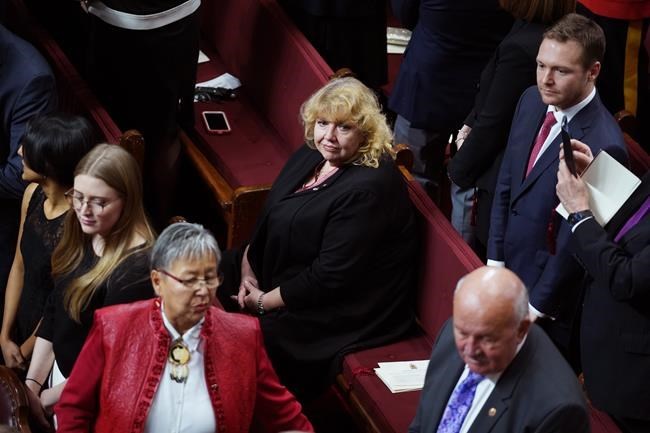OTTAWA — Ontario Sen. Lynn Beyak is leaving the upper chamber three years before her mandatory retirement and defiantly standing by her views on residential schools on her way out.
Named to the Senate on the advice of Conservative prime minister Stephen Harper in 2013, she says she was committed to serving just eight years.
That is the term limit that would have been imposed on senators under the Harper government's original plan to have an elected Senate, which never came to fruition.
Thirty other senators named on the advice of Harper are still in the Senate and all but one — Alberta Sen. Scott Tannas — have now been there more than eight years.
Announcing her early retirement Monday, Beyak said she stands by her controversial statements on residential schools, which played a role in her being ousted from the Conservative caucus and suspended from the upper chamber.
"Some have criticized me for stating that the good, as well as the bad, of residential schools should be recognized. I stand by that statement," she wrote.
"Others have criticized me for stating that the Truth and Reconciliation Report was not as balanced as it should be. I stand by that statement as well."
Beyak got into trouble for publishing derogatory letters about Indigenous people on her website. They were in response to a speech she gave in 2017 about the move to rename the building housing the Prime Minister's Office on Wellington Street in downtown Ottawa, which at that time was named after Hector-Louis Langevin, who was involved in the residential school system.
In that speech, Beyak argued residential schools had done good for Indigenous children, although many suffered physical and sexual abuse and thousands died of disease and malnutrition in them after being forcibly removed from their homes and communities. The schools were operated by churches and funded by the federal government.
The Senate's ethics officer, Pierre Legault, concluded in March 2019 that five of the letters in particular contained racist content. Beyak, who was kicked out of the Conservative caucus over the matter, was suspended without pay from the Senate in May 2019.
She refused for almost a year to delete the letters, casting herself as a champion of free speech and a victim of political correctness.
They were finally deleted from her website by the Senate administration.
She eventually apologized and agreed to take cultural sensitivity training but the ethics committee deemed the initial apology to be perfunctory and the training a fiasco.
Beyak's suspension ended automatically when Parliament dissolved for the 2019 federal election. The Senate voted in February 2020 to suspend her again because, while she had finally offered a more profuse apology, she still hadn't completed an anti-racism course.
Once she did that, the committee finally recommended in June that Beyak be reinstated, but the wider Senate was still debating the committee's report when it broke for the summer and then Prime Minister Justin Trudeau prorogued Parliament.
That meant her suspension was lifted automatically and she was reinstated.
In December, Sen. Mary Jane McCallum, a member of the Independent Senators Group, introduced a motion calling for Beyak's expulsion from the chamber. It was not debated before senators paused for the holidays. The Senate resumes sitting Feb. 2.
In her official letter of retirement to the Senate Monday, Beyak defended both her 2017 speech and her choice to share the letters she received.
She wrote she was attacked by "those with an agenda for power and control, and an aversion to honest debate," with the help of some in the media.
"The fact that a senator dared to speak the opinions of millions of Canadians frightened those same few people, and their fear has been evident every day since, as they have constantly attacked me in Ottawa with unconstitutional motions and costly inquiries, all in an effort to stifle freedom of expression," she wrote.
"Not only has it been my duty as a senator (who constitutionally cannot be expelled), but it has been my privilege, to weather those attacks on behalf of Canadians who value freedom of expression," she continued. "I will treasure the many thousands of letters I have received from all across the country in support of my efforts for the rest of my life."
This report by The Canadian Press was first published Jan. 25, 2021.
The Canadian Press
Note to readers: This is a corrected story. A previous version said Sen. Lynn Beyak's speech on residential schools took place in 2018.




